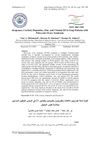2 citations,
August 2022 in “Middle East Fertility Society Journal” The new rodent model successfully mimics non-lean human PCOS symptoms.
 40 citations,
December 2016 in “Journal of Ovarian Research”
40 citations,
December 2016 in “Journal of Ovarian Research” Rutin may help treat symptoms of polycystic ovary syndrome (PCOS) in rats.
 30 citations,
April 2014 in “Seminars in Reproductive Medicine”
30 citations,
April 2014 in “Seminars in Reproductive Medicine” Diagnosing PCOS in teenagers is hard because its symptoms often look like normal puberty, and there's a need for better diagnosis methods and agreement on criteria.
 114 citations,
January 2014 in “World Journal of Gastroenterology”
114 citations,
January 2014 in “World Journal of Gastroenterology” People with PCOS, especially if obese, often have NAFLD, linked to obesity, insulin resistance, and high androgen levels.
 2 citations,
August 2020 in “JCRPE”
2 citations,
August 2020 in “JCRPE” A girl with Denys-Drash syndrome was misdiagnosed due to biotin affecting her hormone test results.
 1 citations,
October 2015 in “Journal of endocrinology and diabetes”
1 citations,
October 2015 in “Journal of endocrinology and diabetes” Understanding Polycystic Ovary Syndrome (PCOS) and its causes can lead to effective treatments.
 9 citations,
September 2015 in “Reproductive Biomedicine Online”
9 citations,
September 2015 in “Reproductive Biomedicine Online” Longer GGN repeats in the androgen receptor gene are linked to polycystic ovary syndrome.
 28 citations,
August 2009 in “Nursing for Women's Health”
28 citations,
August 2009 in “Nursing for Women's Health” Cognitive behavioral strategies help women with PCOS make lifestyle changes to improve their health.
 32 citations,
July 2001 in “Endocrine Practice”
32 citations,
July 2001 in “Endocrine Practice” Insulin-sensitizing drugs like metformin can help with ovulation, weight loss, and lower testosterone in some women with PCOS.
9 citations,
April 2018 in “Biology of reproduction” Diet changes hormone levels in pregnant ewes by affecting metabolism, not placental synthesis.
 25 citations,
June 2012 in “Endocrine”
25 citations,
June 2012 in “Endocrine” PCOS may start before birth, involves metabolic issues, and can be treated with drugs like metformin and lifestyle changes.
 January 2020 in “Asian Journal of Basic Science & Research”
January 2020 in “Asian Journal of Basic Science & Research” Nutrease powder, a high-protein, low-carb supplement, can help manage Polycystic Ovary Syndrome symptoms, regulate periods, improve ovulation, and restore fertility.
 May 2010 in “Current Women's Health Reviews”
May 2010 in “Current Women's Health Reviews” The document concludes that early diagnosis and treatment of PCOS in teenagers is important for managing symptoms and preventing long-term health problems.
 232 citations,
December 2005 in “Andrology”
232 citations,
December 2005 in “Andrology” PCOS is caused by both genetics and environmental factors like diet and obesity.
 September 2024 in “Medicina”
September 2024 in “Medicina” Certain gene variations may protect against skin issues and oxidative stress in women with PCOS.
 January 2025 in “Journal of Clinical Medicine”
January 2025 in “Journal of Clinical Medicine” PCOS is the most common cause of hirsutism, and personalized treatment is important.
 30 citations,
January 2015 in “BioMed Research International”
30 citations,
January 2015 in “BioMed Research International” Continuous light exposure in rats leads to PCOS-like symptoms and suggests sleep habits might affect the disorder's development.
 September 2022 in “Dermato”
September 2022 in “Dermato” Adult acne is often related to hormonal disorders, especially in women, and may need long-term treatment involving specialists.
 5 citations,
February 2023 in “Journal of Clinical Medicine”
5 citations,
February 2023 in “Journal of Clinical Medicine” Diagnosing and treating PCOS in teenagers is difficult, and the focus is on lifestyle changes and medication to improve health and prevent future issues.
 May 2024 in “International Journal of Advanced Academic Studies”
May 2024 in “International Journal of Advanced Academic Studies” Vitamin E helps reduce PCOS symptoms and improves hormonal balance.
February 2024 in “Biomedicines” Pregnant women with PCOS have higher levels of Neurokinin B in the placenta, especially with female babies.
FGF5 spliceosomes inhibit rabbit hair growth by affecting gene expression.

Early detection and comprehensive treatment of PCOS are crucial due to its long-term health impacts and associated risks.
6 citations,
January 2023 in “Evidence-based Complementary and Alternative Medicine” Combining yoga and certain herbs can effectively manage PCOS symptoms and improve quality of life.
 82 citations,
May 2016 in “Best Practice & Research in Clinical Obstetrics & Gynaecology”
82 citations,
May 2016 in “Best Practice & Research in Clinical Obstetrics & Gynaecology” The conclusion is that managing androgen excess requires long-term treatment, including hormonal contraceptives and androgen blockers, with follow-up after six months.
1 citations,
December 2023 in “Animals” Winter provides the best fur quality for Rex rabbits due to seasonal changes in specific signaling pathways.
Certain genes may influence hair loss differently in men and women.
 February 2025 in “Iraqi Journal of Science”
February 2025 in “Iraqi Journal of Science” PCOS patients have higher LDH and lower cortisol, dopamine, zinc, and vitamin D3, which may contribute to their symptoms and obesity.
 35 citations,
March 2012 in “Experimental and Clinical Endocrinology & Diabetes”
35 citations,
March 2012 in “Experimental and Clinical Endocrinology & Diabetes” The conclusion is that accurately identifying the cause of high androgen levels in women with PCOS is crucial and requires specific tests.
 31 citations,
February 2021 in “Nutrients”
31 citations,
February 2021 in “Nutrients” Curcumin may improve blood sugar levels and cholesterol in people with PCOS, but more research is needed.






















